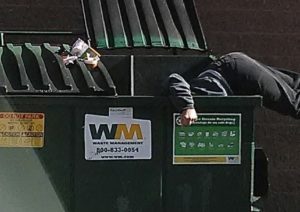The author Robert Farrar Capon was a master of parabolic embellishment, being highly adept at bringing these ancient stories up-to-date through vivid contemporary language and imagery. Sometimes Capon also did what those of us who preach occasionally do as well: he’d name the characters. And so in the Parable of the Prodigal Son maybe we’ll call the older brother Morris such that at the end of the parable the father is able to say something like, “Come on now, Morris, put on a party hat, put a smile on your face, and come in to the feast for your lost-but-found little brother!”
But, of course, what Capon does is just what anyone would have to do with Jesus’ parables: if we want to give a parabolic character a name, we will have to supply it ourselves because Jesus apparently never did so.
Except once.
In Luke 16 we encounter the only character in any of Jesus’ parables who is given a name: it’s the poor man and he’s called Lazarus. The gospel writer Luke does all kind of things in his book to relay to us readers Jesus’ over-riding concern for the poor and the marginalized. From Mary’s “Magnificat” in the opening chapter (and its words about sending the rich away empty but elevating the status of the poor and lowly) to Jesus’ various words in Luke assailing the wealthy, Luke sets his theme clearly before us.
But in this parable Luke manages to tamp down into one tight package almost the entirety of this theme on loving the poor just by giving the poor man in the story a name (or better said, by making sure to remember that it was Jesus himself who gave this character a name). The poor are not faceless people with no stories. The poor are real people with names, identities, and a history. They are not statistics, they are human beings. They are not a one-size-fits-all economic category that we can describe in broad strokes but specific individuals.
The poor man had a name and packed into that fact is a whole lot of theology. Because we do overlook such people on the margins of life. We do act as though they are a socio-economic category more than families and folks with as real a life as anyone else. We forget that such people have names.
What was the line from the Beatles song? “Eleanor Rigby died at the church and was buried along with her name. Nobody came.” But Eleanor Rigby had been a real person, worthy of attention, worthy of love, worthy of extra care from the rest of society and especially from those who were doing well for themselves.
In the parable as Jesus tells it, this is all brought into bold relief for us as Jesus frames the details for us. There is nothing subtle about the set-up. The first man is flat-out said to be rich. He wears purple linen clothing (a royal color and fabric that in Jesus’ day reeked of money the same way a tailored silk Armani suit would do on a rich man today). He lived in the lap of luxury. Even the Greek word for “gate” in verse 20 was not the word you’d use to describe a small gate on someone’s white picket fence but was the word reserved for soaring portals–the kind of huge and heavy wrought-iron gates you see if you drive around Beverly Hills. Jesus wastes no time painting with a broad brush. We’ve got the picture. This isn’t merely someone who is comfortably well-off. This man is super-rich.

The depiction of Lazarus and his lot in life is no-less subtle. He’s not just a panhandler beggar but appears also to be lame and so only can lie at the gates. Worse yet, he’s diseased and so is covered with such dreadful open wounds as to attract the sniffing, and then licking, attention of the neighborhood’s stray dogs. He would have been happy to eat table scraps or even floor sweepings from the rich man’s dining room but you get the impression he didn’t get even those.
Again, Jesus is being deliberately extreme. Trying to picture Lazarus in your mind may lead you to say, “Yuck!” Have you ever seen a poor person pull a half-eaten sandwich out of a garbage can and promptly eat it? Your jaw instinctively tightens, doesn’t it? How bad off would you have to be to flick off pieces of coffee grounds and dirt from a stranger’s castoff cheeseburger before eating it?

Well, you’d be as bad off as Lazarus, for one thing.
And for those of us who find such a situation frankly unimaginable, that alone is an indication of how very much we do indeed have to be thankful for. In any event, in Luke 16 we have the heights of riches and the depths of abject poverty. No shades of nuance here.
The men then die and their roles are reversed. Again, there is no subtlety: Lazarus could not possibly have it better and the rich man could not possibly have it worse. But it is only now that this parable really takes off. It goes without saying that we should not conclude from Luke 16 that people in hell really will be able some day to see those in heaven (or vice-versa). For this parable to work these two men need to see each other.
And when they do, the first thing you should notice is that the rich man recognizes Lazarus and, more strikingly still, even knows his name. He had not been ignorant of the man who had long laid at his gates. So there’s the first zinger: the rich man at first appeared to be guilty of no more than a sin of omission, a passive failure to address a situation he maybe didn’t even know about in the first place. But his sin starts to look a whole lot more aggressive and active once you realize he was aware of this man, even to the point of knowing his name.
We maybe did not expect that to be true of this rich man. His knowledge of Lazarus makes us uncomfortable. And maybe just that is the point, too: we’re forced to wonder how much more we know about the poor people around also us than we are willing to admit or own up to. It’s easier to pretend we’re ignorant, that we don’t know the names of the poor (or cannot even find out). As this parable shows, however, the truth may be otherwise.
In any event, the answer to the rich man’s plea is “They have Moses and the Prophets” The rich man had requested a resurrection of Lazarus as a way to shake them up sort of along the lines of what it finally takes to shake old Scrooge up in the classic Dickens story of A Christmas Carol—it’s only after old Marley is sent back from the dead (and then unleashes three other ghostly spirits) that Scrooge finally converts from being a greedy miser to a generous benefactor for the poor. So also here: “Send dead Lazarus back to them,” the rich man pleads, “and then my brothers will become generous where I was stingy and so avoid this hellish fate!”
But no, they have Moses. They have the Prophets. And that ought to be enough. “They already have something better than a man returned from death,” Abraham says. “They’ve got their Bibles. They’ve got Moses. They’ve got the Old Testament Law. They’ve got prophets like Amos and Micah who ripped into the selfishly rich people of Israel long ago and whose prophetic upbraiding have been preserved as a warning to also future generations. If they won’t listen to the living voices of Scripture, neither will they listen to a dead man like Lazarus who will say to them the exact same things.”
In other words, those who find it easy to ignore Scripture will find it equally easy to ignore anyone who quotes Scripture to them. They have Moses. And if he’s not enough for them, neither would Lazarus be. Or anybody. The rich man before he died, and now his surviving brothers, had every opportunity to know better all along. When it comes to just treatment of the poor, no one with a Bible can claim not to have known any better.
“They have Moses,” Abraham tells the tormented rich man in hell. We have Moses, too. We have Moses. What’s more, now we have Jesus. In this powerful parable our Lord asks us what we will do with the knowledge we have by faith as that knowledge comes to us from the Word of God. What kind of lives will we lead? What kind of government policies will we get excited about? What kind of congregation should we be in the midst of the community where we find ourselves? We have Moses. We have Jesus. Will we listen to what they say?
Illustration Idea
In January 2019 I had the privilege of introducing New York Times columnist Nicholas Kristof as part of Calvin University’s “The January Series.” Here is the first part of that intro:
“Jesus told upwards of 40 parables in the New Testament. Each had a small cast of characters: waiting fathers and prodigal sons, women baking bread and laborers in a vineyard. But only once did Jesus assign a character a name: it was the poor man, Lazarus. Jesus knew that if we treat people only by categories like “the poor,” it is too easy to mistreat them, to forget who they really are But Jesus knew that each such person has a name, a family, a story. Giving Lazarus a name brought forward the humanity of “the poor.”
For decades Nicholas Kristof has been doing exactly this for victims of war, poverty, and genocide. The ethnic cleansing in Darfur was not about nameless groups of victims. It was about 2-year-old Zahra Adbullah beaten to death in front of her mother Fatima Omar Adam. The U.S.-backed, Saudi-led war in Yemen is starving not faceless millions of children but specifically 12-year-old Abrar Ibrahim—the photo of her emaciated body was so searing, it basically was the entirety of Mr. Kristof’s column a couple weeks ago.
In short, sometimes we need names and faces to put to otherwise faceless, anonymous categories of people. It makes all the difference in what we see. No, in WHO we see.
Sign Up for Our Newsletter!
Insights on preaching and sermon ideas, straight to your inbox. Delivered Weekly!
Sermon Commentary for Sunday, September 29, 2019
Luke 16:19-31 Commentary